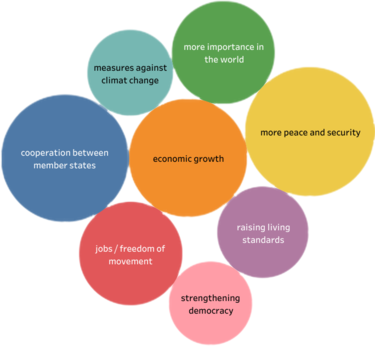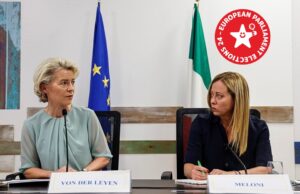Using Eurobarometer data, transform! Co-President Cornelia Hildebrandt analyses the Ukraine war’s impact on EU population perceptions and anticipates 2024 EU election’s issues. The social issue especially dominates, while EU measures taken in 2019-2023 in the wake of Brexit, pandemic and war show that social improvements are indeed possible.
Using Eurobarometer data, transform! Co-President Cornelia Hildebrandt analyses the Ukraine war’s impact on EU population perceptions and anticipates 2024 EU election’s issues. The social issue especially dominates, while EU measures taken in 2019-2023 in the wake of Brexit, pandemic and war show that social improvements are indeed possible.
Notes on the new conflict lines and their perception based on the ‘Standard Eurobarometers’ published between winter 2021/2022 and February 2023 in the form of working theses.
Thesis 1: The general conditions in the run-up to the 2023 European elections have changed fundamentally compared to 2019.
The political situation has changed fundamentally compared to the situation in 2019 as a result of Russia’s war of aggression on Ukraine. This war is an expression of intra-imperialist contradictions and represents a historical caesura not only in relation to Russia, but even more in relation to the changing global balance of power in the struggle for spheres of influence and resources under the conditions of incipient climate crises with social, economic, political, and ecological consequences worldwide. At the same time, the political balance of power has changed in favour of a strengthened political right and a growing power of the far-right parties.
While it is open whether the left will be able to form a left-wing government again after the elections in Greece and whether it will be possible to participate in a government as in Spain, the extreme right is ruling in Italy. In France, Le Pen reached for power as the second strongest party; in Finland, True Fins are now part of the government; in Sweden, the three right-wing parties have agreed on a new government and are supported by the Sweden Democrats. But in other EU countries, too, the extreme right remains at a high level or is growing stronger. In Belgium, the parties of the extreme right (Vlaams Belang, N-VA) are stable in polls at a total of 40%, in Austria the FPÖ is at 28%, in Germany the AfD is at 18%, in Bulgaria Rival is at 14%, in the Netherlands the PVV is again at 14%, in Spain the VOX was in this July’s election at 12.39%, ahead of Sumar at 12.4%, and in Portugal the Chega is also ahead of the Bloco at 13%.
However, the shifts to the right also took place within the mainstream parties, such as the Danish Social Democrats or even the liberals like Macron’s LREM, for example, on the issue of migration and immigration. This became visible with the asylum decision of the EU interior ministers to de facto abolish the right to asylum within the EU. This was even supported by the Greens in the governing coalition in Germany. With the Ukraine war, the militarisation of the EU became visible as another issue rallying majority support. Political majorities – including the Greens in Germany – stand for the militarisation of the EU and the pursuit of a 2%-GDP military spending target in the framework of a NATO agreement.
This means for the Left in Europe and especially in the European Parliament, where it is the smallest parliamentary group with 39 deputies, that it can hardly count on political support from other party families in formulating counterstrategies on the migration issue and even more on the peace issue. In terms of peace policy, it is currently politically isolated and, in view of the weak peace movements in most EU countries and the high approval ratings among EU citizens in almost all EU countries of the decisions on Ukraine (there is less than 50% approval only in Bulgaria, Cyprus, Slovakia and Greece), also socially in the minority. However, with the duration of this war, its aftermath and the ongoing crisis phenomena, as well as the continued threat of inflation, the economic crisis and the increased consequences of climate change, this can quickly change. To this end, however, the left must further develop its peace policy profile, offer independent peace and security policy alternatives and work out new alliances at all levels.
Thesis 2: In view of global developments, the developments in the UK after Brexit and the Ukraine war, the perception of the EU and NATO is changing.
People in Europe feel the impact of the multiple crisis and the powerlessness or inability of the political classes to respond to it. Consequently, the optimism index (Eurobarometer) in 2021 was at a negative level similar to 2008 – the year of the financial market crisis — at minus 35 percentage points. This figure was minus 24 in 2022, significantly worse than in 2019 (between -4 and -19). There are 65% of people in the EU in 2022 who believe that the war in Ukraine will change their lives: 90% in Greece; more than 80% in Cyprus, Lithuania, Slovakia; more than 70% in the Czech Republic, Latvia, Estonia; more than 60% in France, Belgium, Slovenia, Germany, Hungary, the Netherlands, Portugal, Bulgaria, Hungary, Finland; 60% in Poland, more than 50% in Austria, Luxembourg, Sweden, Romania, Denmark, Italy; less than 50% in Malta and Ireland. Meanwhile, 69% of people in the EU completely or somewhat agree that the capacity to produce military equipment should be strengthened. And 84% want to reduce dependence on Russian energy.

Considering global developments and the war in Ukraine, the EU is increasingly seen as a protective and security space. More than 6 in 10 Europeans (62%) believe their country’s membership in the EU is a good thing, 72% believe their country benefits from EU membership, 22% do not. From the respondents’ perspective, they associate their countries’ EU membership with:
- 36% with more peace and security,
- 35% with cooperation between member states,
- 30% with economic growth,
- 23% with more jobs/freedom of movement,
- 23% with more importance in the world as EU state,
- 18% with raising living standards,
- 16% with measures against climate change,
- 15% with strengthening democracy.
They are 79% in support of European cooperation to secure sustainable infrastructures, 77% support a common defence policy and 70% also support a common foreign policy. Over 70% of respondents support a common trade and monetary policy — over 80% in the euro zone. These high approval ratings for a common defence and foreign policy must be viewed in the context of the risk of an expansion of the Ukraine war.
Among the most important problems, the growing cost of living (93%) and the threat of slipping into poverty and social exclusion (82%),are immediately followed by climate change and the spreading of the Ukraine war with 81% each: global warming and expansion of the war are equally weighted. The social issue is directly related to the war in Ukraine and its consequences.
In other words, the social question is dominant again, but unlike in 2014, it is not tied to a crisis of capitalism, but to the Russian war of aggression against Ukraine, i.e., to war and its consequences. That is, the new austerity policy can establish itself as a narrative about the price of freedom, and at the same time war is being normalised as a legitimate instrument for the enforcement of Western interests and the defence of Western values.
For the left, which is well aware that the majorities in most countries of the EU are behind the measures of the EU to support Ukraine including with arms deliveries, the necessity arises to expose the class character of this war and its consequences and to formulate the issue of a sustainable peace as social matter of existential importance. Investments in public infrastructures, the protection of social benefits and services are not possible with the return of austerity policies, even against the background of the massive increase of military budgets to at least 2% of GDP.
Thesis 3: Within EU countries and at the European level, lines of conflict arise from social and political inequalities and the growing need for climate policy measures, but they are obscured in the mediatic landscape by the war.
It became apparent from 2019 that would be no “grand coalition” politics, but rather, due to the impossibility for social democrats and conservatives to secure a majority together, policy-making with changing majorities — depending on the topic — which would include the Left, the Greens or, when necessary, the far right. The agenda is set by new political majorities, as in the case of the migration issue, but also by external factors, such as climate change or pandemics. In 2020 to 2023, those opened a window for measures that previously seemed unthinkable — like the suspension of the Growth and Stability Pact, the creation of the Next Generation fund to strengthen the (green, digital, a little more social) sustainability and resilience of EU countries, the “Fit for 55” package aiming to reduce net greenhouse gas emissions by at least 55% by 2030. There has been an expansion of the social pillar with concrete action plans from 2021: from the recommendation for Child Guarantee (a minimum basic income for children), to minimum wages in 2022 and programs to work out long-term care and intergenerational integration. Minimum standards for social infrastructures are also discussed, as well as a minimum income (social safety net). That is, there was a window of opportunity between 2019 and early 2023, under pressure from the Brexit momentum, the pandemic, and the climate change, in which neoliberal austerity policies could be pushed back via majorities in the Parliament, Commission, and EU Council — European policies changing from above, not as the result of powerful demonstrations or leftist interventions. Nevertheless, these experiences and changes must be taken up and worked on by the left and, even more, vindicated: changes and even social improvements are possible.
Thesis 4: The social question is becoming increasingly pressing in all EU countries, yet the issues are weighted to some extent differently at the EU level.
The fundamental problems of today’s developments are seen by EU citizens in all countries and reflected in the context of the Ukraine war, yet they are weighted differently by EU citizens in their countries. The majority of people in the EU — with the exception of Ireland — assume that the war will bring about change.
The following are cited as important political priorities: 37% fighting poverty and social exclusion (first-named priority in Portugal, Greece, Lithuania, Bulgaria, Slovakia, Belgium, and Luxembourg) 34% public health (the first priority in Cyprus, Spain, Ireland, Slovenia, Hungary) 31% climate change action (the first priority in Sweden, Netherlands, Denmark, France, Austria, Malta) 27% democracy and rule of law (the first priority in Finland and Germany) 24% defence and security (the first priority in Poland) 17% Autonomy of industry and energy (the first priority in Czech Republic)
The social situation is worsening in all EU countries: 46% get by only partly, 36% have “some problems”, 9% have “a lot of problems”. In Malta, Hungary, Cyprus, Romania, Italy, Portugal, Bulgaria and Greece, about 50% have problems paying their bills, over a third in Slovenia, Spain, Latvia, France, Estonia, Belgium and Ireland, over 25% in Germany, Hungary, the Czech Republic, Poland, Slovakia, Austria and Lithuania.46% have reduced their spending as a result of the Ukraine war especially in Cyprus (70%), over 60% in Greece, Malta and France, over 50% in Portugal Spain, Belgium and UK, over 40% in Czech Republic, Ireland, Croatia, Estonia, Hungary, Italy, Slovakia, Germany, Lithuania and over 30% in Romania. Only 14% EU-wide do not expect to have to reduce their standard of living.

Expectations towards the EU:
Expectations towards the EU were focused on relief and compensation measures, especially in times of pandemic. Basically, these expectations are linked to the role of the EU member states within the EU and political influence, to their economic and social resources and, with the Ukraine war, to their geographical location.
Cooperation between EU countries, for example, is a top priority for EU citizens in Sweden, Denmark, Finland, the Netherlands, Belgium, Italy, and Austria. In Bulgaria, Croatia, Hungary, Romania, Czechs and to some extent in Estonia, it is the job opportunities through the free movement of workers. For Malta, Ireland, Lithuania, Slovenia, Luxembourg, Spain, Portugal and to some extent Poland, the priority is economic growth, and for Germany, Greece, Cyprus, Latvia, and France, it is the common security policy.
Thesis 5: The view of EU policies differs not only in terms of the country I come from, but also depends on age, level of education and social status.
The view on EU policies differs depending on age, education, and social status: the younger the respondents and the higher the formal education level, the higher the trust in the EU. For the generation of 18-24 year-olds, this amounts to almost 60%, for the following generations it stays below 50%. For the generations over 55, it is lowest at 43%. For today’s young generations, the Lisbon Treaty and even more so the Maastricht Treaty of 1992 are history, and in addition for some a defeat of earlier struggles in which they were not involved; the treaties are no longer the result of struggles but the starting point of future EU policies. School children and students are much less critical of European policies and of policies communitarised at the EU level. The approval ratings for foreign, security and trade policies, but also for other policy areas such as tax or energy, are well above 80%; for fight against climate change, minimum wages, taxation of large companies, defence of European values and freedom of movement, they are above 90%. However, there is one value that clearly stands out: 25% of the students surveyed oppose Frontex. This is one of the highest disapproval ratings to Frontex after upper-middle-class executives at 26%.
The approval ratings for European policies by workers, housewives and the unemployed contrast with the preceding numbers. More than one in four in these groups opposes a common foreign and immigration policy, and one in five workers opposes a common defence and asylum policy – for this, disapproval is significantly lower among housewives and the unemployed.
Workers are also more opposed than average (16%) to measures against the gender gap or about climate change as well as against cooperation measures for public infrastructure, immigration regulation and European asylum policy. For just under half of workers, democracy in their country is not good and their vote in the EU does not count. This figure is even higher among housewives and the unemployed at about 60%, and among those who are among the poor in the EU (those who almost always have trouble paying their bills — a Eurobarometer category), it is 70% — at the national level, it stays about 10% lower.
However, there are high approval ratings of well over 80 to 90% among groups of housewives and unemployed, slightly weaker among workers, the poor (who cannot pay their bills), the working class and lower middle class on measures to close the gender gap, combat climate change, and tax big businesses. There is over 90% approval for the minimum wage. In other words, the social question can and must be placed centrally and used as a bridge to the other issues.
Thesis 6: The strategies of the left parties in Europe must develop their electoral strategies on a fundamentally different basis – Conclusion and consequences for the election campaign.
The cleavages structures have changed at the national and European level since the 2014 European elections and have repercussions on the development of the national and European balance of power.
The 2014 European elections were characterised by struggles against austerity policies with their social and environmental consequences, but without prioritising the environmental issue. In 2014, priority issues included 1. unemployment as a dominant problem across Europe, 2. rising cost of living, 3. immigration, 4. health and social security, 5. economic situation, 6. pensions.
In 2019, the socio-economic issues were no longer dominant issues: the Policrisis led to a polycleavages landscape with no dominating issue: unemployment, cost of living, migration, health social infrastructure, the economic situation of the people, the country and the EU, the issue of pensions were more or less equally weighted.
In 2023, the social issue becomes dominant again, but coupled with the Ukraine war and its global consequences, especially in the form of rising energy and living costs.
In 2023, 93% see the rising cost of living as the biggest problem; 82% fear social decline or a slide into poverty; 81% fear the impact of war and just as many fear the impact of climate change; 74% see the risk of a nuclear catastrophe; for 70% — also linked to war and climate change — migration is an unsolved problem and possibly a threat. At the same time, 72% of EU Europeans fear the loss of democracy and European values — whatever is understood by this.
The associated uncertainty is made visible in the Eurobarometer data by the optimism index, which is at the same level as in 2012, although it is unclear how the successive crises since 2008 are being dealt with. Looking at political developments, the far right is benefiting while conservative and social democratic parties are losing ground and the left appears stable.
According to EU surveys, the radical left could enter the EU Parliament in 2024 with up to 50 members. However, this increase is mainly linked to the strengthening of the left in Ireland (Sinn Fein), in France (NUPES – currently at 25% in the polls, ahead of Le Pen at 24%), in Belgium (PTB currently at 20% in the polls). The left in Greece and Spain in the midst of their election campaigns have a slight upswing — whether this will be enough for a left-wing government in Greece and a centre-left government in Spain is an open question. Cyprus’ AKEL is losing slightly — the other parties are more or less unchanged — and have limited opportunities to enter the EU Parliament due to the country’s small number of seats. The situation in Germany is completely open.
Two challenges for the Left are already apparent at the European level for their representation in the European Parliament: the left-wing parties from the Central Eastern European countries might not to be represented in the European Parliament (currently represented only by Czech KSČM, holding still one mandate). Second, strong parliamentary parties in the next EU Parliament are either only with observer status with the European Left Party (EL) or are not EL member parties — such as La France Insoumise, Sinn Fein, the Belgian PTB, the SP of the Netherlands and the Swedish Left Party.
In other words, the Left urgently needs to strengthen and intensify its cooperation capabilities at the European level between the Left parties in Europe and between the European actors, i.e. the Party of the European Left, The Left in the European Parliament, transform! europe as European Political Foundation affiliated to the Party of the European Left.
Whether the perpetuating insecurity caused by wars and crises, the political and media business of fear drives further to the right, while neoliberal-influenced individualisation and isolation drives people who are in search of answers that would offer them security and hope into the clutches of patriotic-nationalist pied pipers, thus further promoting authoritarian tendencies in the EU, or whether the search for collective solidarity answers and the formation of counterforces succeeds, depends to a large extent on the left. In the conflicts, it must address the class issue along each assessed line of conflict in a concrete and plain way that can lead to relevant action, and to this end strategically combine its national and European political endeavours. Without concrete practical value for the people of Europe, the left won’t work it out, neither nationally nor at European level.
These notes are based on the Standard Eurobarometers 96, 97, 98 and 98.1.



